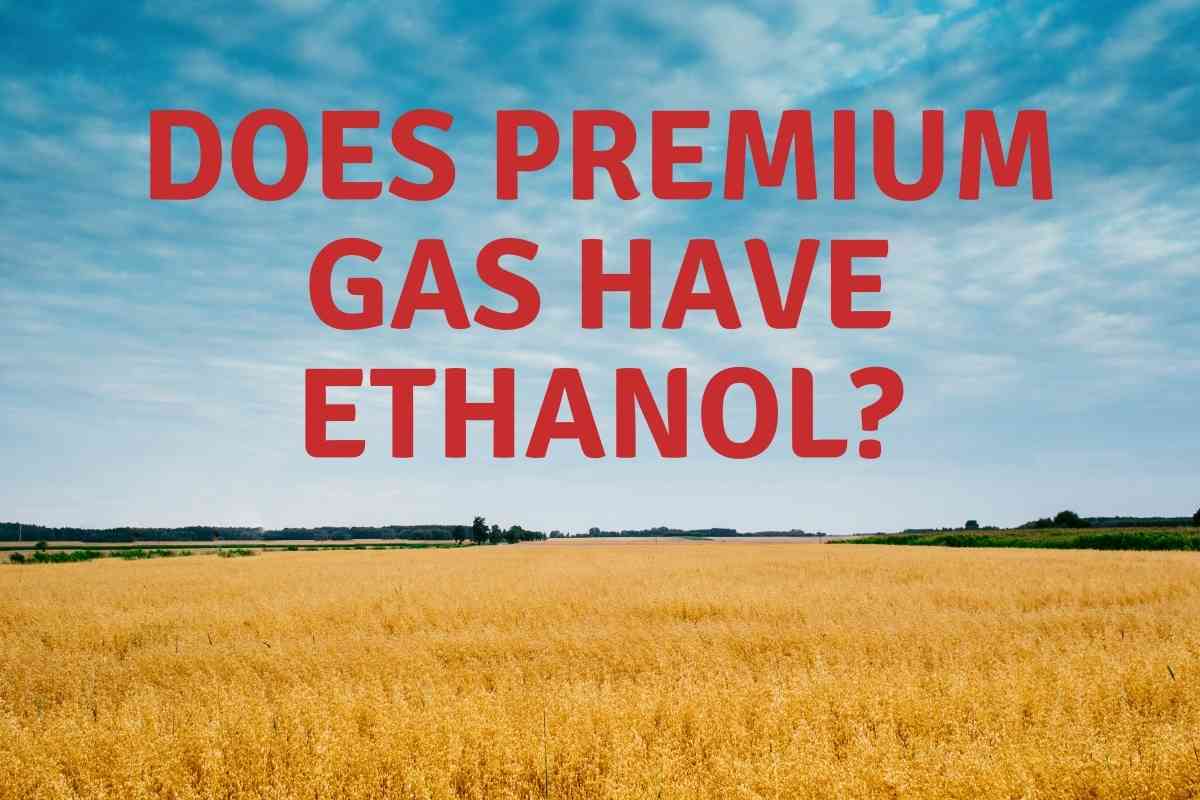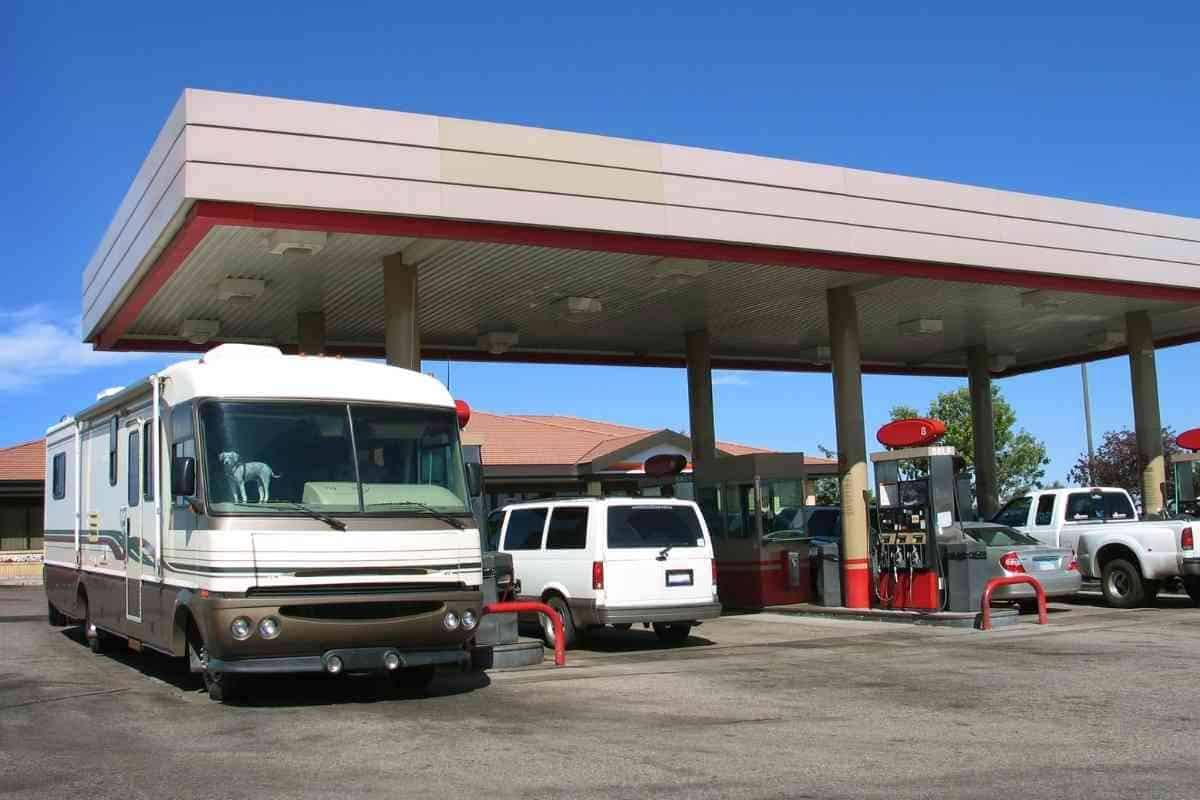Does Premium Gas Have Ethanol?
Have you ever bothered to understand the components that make up your gas? Drivers will often ignore this since all they want is to move from point A to point B.
However, it is important to understand what constitutes your gas.
The differences between premium gas and regular gas feature more in discussion as opposed to the amount of ethanol in the fuel.
The two types of gas have almost similar additives, only that premium gas has a higher resistance to detonation than lower octane gas.
So, does premium gas have ethanol?

Does Premium Gas Have Ethanol?
Premium gas has ethanol as one of its additives. Ethanol is added to premium gas to raise the octane level and differentiate it from the low-octane regular gas. The amount of ethanol in premium gas will differ from one grade of fuel to another.
However, it is important to note that some premium gas may or may not contain ethanol, depending on which state you live in.
Ethanol-free premium gas is used and allowed in some states in America.
To meet the high-octane criteria, refineries will use ethanol to raise the levels.
Debate remains on whether the high-octane level translates directly to increased performance.
One of the reasons premium gas doesn’t improve gas mileage is because crucial components of the blend contain less energy, which naturally lowers the gas mileage.
Premium gas Vs Regular Gas?
Whether you should use premium gas or regular gas on your vehicle should be subject to the manufacturer’s recommendation.
Look at the owner’s manual for the stipulated type of fuel that you should use.
Continued use of the wrong octane level fuel on your engine will lead to long-term damage to your engine.
Using the wrong fuel once is not a problem.
Chances are that you may make a pit stop and realize that the gas station doesn’t have the type of gas that is recommended for your vehicle.
When this happens, you can use whichever is available.
But ensure you use it up and re-fill with the correct gas.
Modern vehicles come equipped with sensors and internal mechanisms that will detect the type of gas put in the tank.
The system will adapt the engine to the octane level available.
There will be no significant changes in the performance of the vehicle, but you should not do this frequently.
Premium gas contains the same amount of ethanol as regular gas.
Therefore, unless it is recommended by the manufacturer in the owner’s manual, you don’t have to spend the extra buck unnecessarily.
Premium gas offers no additional power or better additives.
It is simply more resistant to knocking than lower-octane gas.
Frequently Asked Questions (FAQs)
Does premium gas offer better mileage than regular gas?
There are a lot of myths going around about premium gas and what it can do to your vehicle.
Whether you get a better gas mileage from premium gas is highly contested.
Very many other factors come to play when it comes to fuel efficiency and the performance of your vehicle.
Premium gas has ethanol as one of its additives.
This is meant to raise the octane level of premium gas, hence making it more resistant to detonation.
However, this will drastically reduce the amount of energy that the fuel can produce and so will the gas mileage.

Will premium gas clean my engine?
All types of gas will have cleaning additives.
These are the chemicals or detergents used to clean your system of debris or foreign material.
All grades of fuel have to meet the EPA minimum requirement for additives.
However, some brands add a little extra detergent additive to their premium-grade gas.
This is why many people assume that premium gas is a better cleaning agent than other fuels.
Check your owner’s manual for the octane rating set by the manufacturer for best performance.
It is best to stick with 89 or 93 octane fuel if your engine has been designed for this premium gas.
There is, however, some exception when it comes to supercharged and turbocharged heavy-duty engines.
When you notice your engine knocking when you hit the pedal, chances are that you are using the wrong octane level fuel.
Can I keep premium in my garage for a long time?
Gas that is meant to be used on small engines can be stored for a whole season if it is kept safely in a firmly sealed metal container.
Don’t fill the container to the brim.
The container must have some room for expansion at the top.
Although, ethanol separation, gum formation, and oxidation might occur if your gas container doesn’t close properly or if the spout is left open.
Ethanol corrodes carburetors, ruins fuel lines, and jams up the entire system.
You can add gas stabilizers to reduce the chances of separation.
Is it necessary to use gas that has additives?
It is impossible to boost your gas efficiency without using additives. Although some car owners choose to use gas-system cleaners on regular basis.
You can buy these additives separately and add them to your tank to carry out the same task.
Polyetheramine and Polysobutylamine are the most effective additives to use with any type of gas that your engine is using.
Check your owner’s manual for the amount and type of additive to use as this will vary from one vehicle make and model to the other.
Be careful with the type of additive you use in your engine.
Is there a better gas brand?
In the past, you could say that some gas brands were better than others. Some popular brands would sell themselves as the leaders and the only source for high-quality gas.
However, with the standardization of the industry today, there are no good or bad brands. You are less likely to find sub-standard gas in the gas stations.
All gas distributors in the United States must have a minimum amount of fuel system cleaning chemicals as mandated by EPA.
A few minor differences exist from one brand to the other.
All gas brands of gasoline have their unique formula made of 150 components.
Also, confirm the manufacturer’s recommended gas brand for your vehicle.
Different engines may not be able to handle the same brand and gas grade well.
Other design considerations of the engine have to be put into consideration when choosing the gas to use on your vehicle.
How can I dispose of gas that has overstayed?
You can dispose of old gas by mixing a small amount of the gas (say 1 gallon) in your gas tank.
Alternatively, you can take your old premixed gas to a hazardous waste recycling facility near you.
Get the recommendation of an expert before you use it in your vehicle because it may cause contamination.
Is there a difference between winter and summer blends?
Gas will only ignite when it is in vapor form inside the cylinder.
Due to the lack of gas vaporization in carburetors and fuel injectors, they are only capable of dissolving it into tiny atoms.
When it’s hot outside, atomized gas readily vaporizes, but when it is cold, it needs assistance.
It is because of this that refineries switch to a winter blend of lighter hydrocarbons, like butane and ethane when the weather gets chilly.
These ingredients are reduced in the summer and returned to their regular summer blends.
It is a good idea to just use gas for one season so that you always have the right mixture for the weather conditions.
Is gas with 85 percent ethanol the best for my car?
If your vehicle can run on standard E-10 gas and E-85 gas, it is considered a flex-fuel engine.
This gives you freedom of choice to work with both ethanol levels.
There are several ethanol concentrations in E-85, depending on the season, as well as on the relative cost of hydrocarbon and ethanol.
Even though E-85 contains 27 percent less energy per gallon than the E-10 gas, it will offer about 27 percent fewer miles per gallon out of each gallon.
E-85 may be more affordable than E-10 gas.
You need to take into account the lower mpg when deciding whether to use E-85 in your flex-fuel car.
